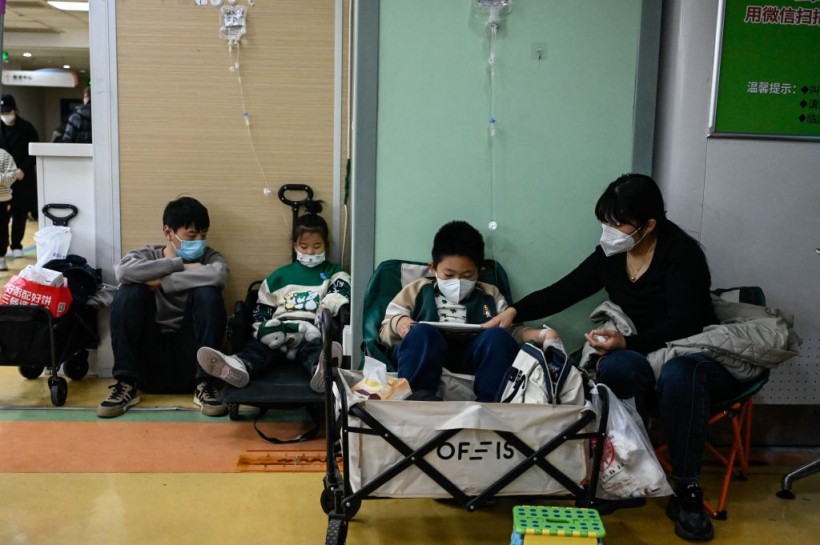The World Health Organization (WHO) has officially requested comprehensive information from Beijing regarding a mysterious pneumonia outbreak in northern China, particularly impacting children.
The request comes as the United Nations health agency expresses growing concerns about an upswing in respiratory illnesses and reported pneumonia clusters among children, according to Al Jazeera.
The National Health Commission of China attributed the increase in respiratory diseases to the relaxation of COVID-19 measures, leading to the spread of various pathogens, including influenza, mycoplasma pneumonia (common in younger children), and respiratory syncytial virus (RSV).

Children receive a drip at a children hospital in Beijing on November 23, 2023. The World Health Organization has asked on November 23, 2023, China for more data on a respiratory illness spreading in the north of the country, urging people to take steps to reduce the risk of infection. China has reported an increase in "influenza-like illness" since mid-October when compared to the same period in the previous three years, the WHO said.
Pneumonia Surge Overwhelming Hospitals
ProMED, an online medical community, has highlighted numerous media reports this week about clusters of undiagnosed pneumonia among children in northern China. Reports from Taiwanese media outlet FTV News indicated overwhelmed children's hospitals in Beijing, Liaoning, and other northern regions, prompting parents to question whether authorities were concealing an epidemic.
The WHO, acknowledging the unclear connection between the northern China outbreak and the overall rise in respiratory infections reported by Chinese authorities, has formally requested detailed information. This includes epidemiologic and clinical data, laboratory results from reported clusters among children, information on pathogen circulation, and the current burden on healthcare systems.
Dr. Krutika Kuppalli from the WHO's emergency program commented on social media, emphasizing the need for more information about symptoms, epidemiology, and testing, considering the broad range of potential causes of the illness.
Read Also: Deep Sleep Deficiency: People Over 60 Face Higher Dementia Risk, Study Finds
"While WHO seeks this additional information, we recommend that people in China follow measures to reduce the risk of respiratory illness, which include recommended vaccination; keeping distance from people who are ill; staying home when ill; getting tested and medical care as needed; wearing masks as appropriate; ensuring good ventilation; and regular hand-washing," the global health agency noted in its statement.
In response to the situation, Chinese authorities stress the importance of enhanced disease surveillance in healthcare facilities and community settings. They also emphasize the need to expand the health system's capacity, which is currently overwhelmed due to the increasing number of infected children.
An Aftermath of China's COVID-19 Pandemic Restrictions
China has witnessed a surge in influenza-like illnesses, diverging from the strict measures enforced under the zero-COVID strategy over the past three years. This strategy was abruptly abandoned in December 2022.
The previous zero-COVID policy, which included strict lockdowns, widespread testing, and contact tracing, stopped the spread of common infections. The shift away from these measures may have created an "immunity gap," leaving people more susceptible to infections once such precautions are discontinued, according to a CNN report.
The initial cases of what later proved to be COVID-19 were initially identified as unexplained pneumonia in late 2019. The first fatality from the illness occurred in January 2020, coinciding with China's public release of the genetic sequence of COVID-19. Expressing profound concern over the virus's rapid transmission, its severity, and a perceived lack of decisive action, the World Health Organization (WHO) officially declared a pandemic in March 2020.
Related Article: UK Proposes Tech Solutions for Food Security at Global Summit










